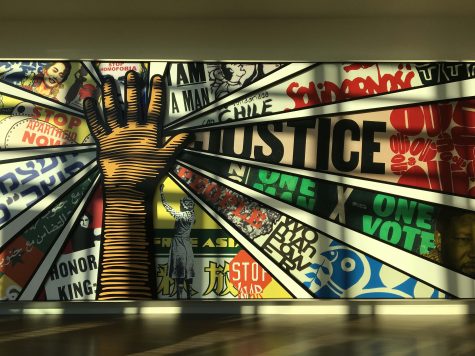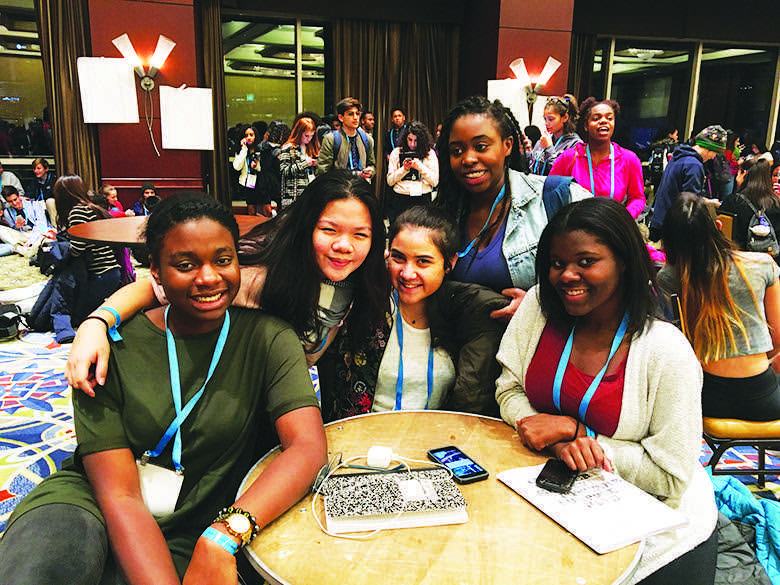SDLC prompts students to evaluate diversity at Hackley
Conference inspires Hackley delegates
Credit: Lei Anne Rabeje
Students who attended the conference hope to increase the dialogue about issues pertaining to experiences of oppression.
December 18, 2016
The birthplace of civil rights leader Martin Luther King, Jr. and home to the Center for Civil and Human Rights, Atlanta, Georgia housed students from independent schools across the United States — from California to New Hampshire — on December 8-11. The turmoil from president-elect Trump’s recent election fostered new energy for change at this year’s Student Diversity Leadership Conference. Senior Ivie Uzamere and juniors Alex Hayward, Kioni Marshall, Lei Anne Rabeje, and Hallie Robin congregated with over 1600 students in the historically rich city to speak about their struggles as minorities at their schools, offer guidance and counsel to the marginalized, and listen to other people’s experiences.
Bryan Stevenson, an acclaimed public interest lawyer dedicated to helping the poor and the incarcerated, kicked off SDLC 2016 by prompting students to get close to the problems and embrace discomfort. Stevenson stirred over 5000 SDLC and People of Color Conference attendees with compelling recounts of previous clients on death row. Stories of clients suffering from mental disabilities and schizophrenia, poverty, and depression who faced the death penalty due to unjust convictions made people shift in discomfort. Many had tears in their eyes as he recounted a tale of the 11-year-old boy raped and physically abused in an adult prison after shooting his mother’s abusive boyfriend clouded by anger and distress. His agonizing stories fostered discomfort and anger amongst the students.
Hailing from over 250 schools, many students in attendance identified themselves as the minority within their schools. Most felt underrepresented within their communities, whether from the lack of conversation about mental health to the eurocentric history curricula in their schools. All wanted to generate change, discussing various ways to create conversation within their communities about the eight social identifiers — ability, age, ethnicity, gender, race, religion, sexual orientation, and socio-economic status.
Within family groups (groups of 70 students) named after social justice figures, people spoke about stereotypes and explored their histories, discussed gender jargon, and examined the roots of inequality. Through spectrum activities, students challenged each other’s perspectives on controversial topics, like pro-choice versus pro-life, blue lives matter versus black lives matter, and death penalty versus life sentencing.
Senior Ivie Uzamere, who attended SDLC ‘14 at Indianapolis, Indiana and SDLC ‘16 at Atlanta, Georgia, expressed the importance of difference and the pride many gain from the conference for their culture and identity. “Being the only black girl in Hackley’s senior class, it was great to be surrounded by individuals who look like me,” said Ivie. “I do not think attending SDLC changed the way I viewed the Hackley community, but instead emphasized the problems that I have seen within our community. I truly believe that students and teachers are very much sheltered. They are not aware of the issues that the oppressed experience, in regards to race, ethnicity, gender, sexual orientation and/or ability. It is important to start a dialogue around certain issues and not shy away from uncomfortable conversations.”
Bryan Stevenson’s stress on the significance of uncomfortable conversations is the root of the Hackley delegates’ plan to foster dialogue within the community. “I would like to bring back the activities that we did at SDLC,” said Ivie. “Activities such as the privilege walk, silent movement and spectrum activity would be very beneficial to our community because it would start conversation and allow individuals to recognize and use their privilege as a way to fight the systematic oppression that exists today.”
The success of these activities will rely on the community’s willingness to embrace discomfort and the unknown. While many recognize the “Hackley bubble,” few are willing to challenge their perspectives and listen to opposing views. “I think that that one of the challenges I expect to to face is dealing with people who are afraid to step out of their comfort zones,” continued Ivie. “I think that many people will be in denial of how messed up our country really is because they have been constantly put in a bubble at Hackley.”
The SDLC Closing Conference held at noon on Saturday, December 10 honored Civil Rights Leaders Christine King Farris, Henry Louis (Hank) Aaron, and Congressman John Lewis. The three speakers encouraged the students to generate uncomfortable conversations within their communities, while recounting their previous works for social justice- from continuing her brother, Martin Luther King Jr.’s, advocacy for non-violent protest to create change to utilizing his passion and fame from baseball to spark racial conversations on field and in schools.

Hackley’s SDLC delegates visited the Human and Civil Rights Center to commemorate Human Rights Day on December 10.

